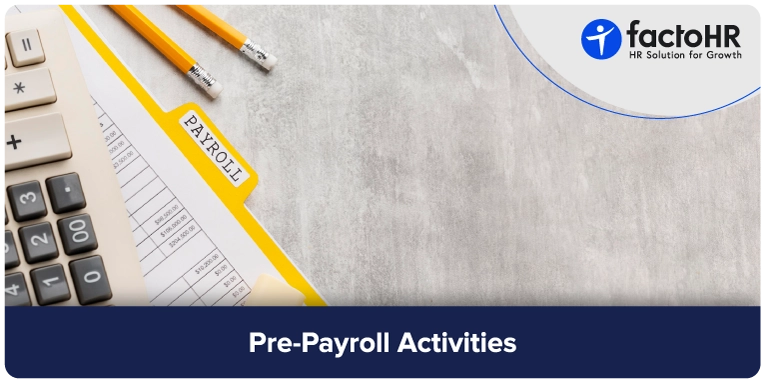Pre-Payroll Activities: A Detail Overview

Table of Contents
The payroll process impacts a company’s finances and employee relationships. Pre-payroll tasks, which come before processing payroll, are often overlooked. These activities set the policies for the payroll process. This article explains more about Pre-Payroll Activities.
What is Payroll Processing in India?
Payroll processing meaning is calculating the total earnings and deductions to determine the net salary an employee gets. These are often designed based on the laws and rules of government. The formula to calculate payroll in India is as follows:
Net Salary = Gross Salary – Professional Tax – Public Provident Fund – Income Tax ( Gross Deductions)
Note:
Gross Salary= Basic salary + House Rent Allowance + All type of Allowances + Reimbursements + Arrears + Bonus
Gross Deductions= Professional Tax +Public Provident Fund +Income Tax+ Insurance + Leave Adjustments + Loan repayments (if applicable)
In India there are three stages of payroll processing; pre-payroll, actual payroll, and post-payroll. So, a payroll process to be precise and on time the following has to happen at each of these stages.
What are the Pre-Payroll Activities?
Before paying employees, certain tasks and procedures must be completed to ensure accuracy, efficiency, and compliance with legal and company requirements. These pre-payroll activities are essential for calculating and distributing employee wages.
Setting Payroll Policies
Creating payroll policies is the first step. They must be approved by management. Examples include wage, attendance, leave, and benefits policies. Proper management and timely payments require well-defined payroll policies and procedures.
Creating guidelines for taxed, non-taxable, and partially taxable perks and benefits
Employers provide taxable benefits to their employees in addition to basic income. The IT Act 1961 divides taxable benefits into two basic categories: allowances and perquisites. An allowance is usually granted to employees to cover expenditures incurred while working. On the other hand, perquisites are additional benefits an employer grants its employees. Allowances or benefits are grouped into three types under taxation: taxable, partially taxable, and tax-exempt.
Data Collection
The initial stage in pre-payroll activities is to collect all employee-related data. This contains employee information such as names, residences, social security numbers, tax withholding data, bank account information for a direct deposit, and any modifications in employment status or salary. Other than this leave data, payments and deductions data, attendance data, and more are also collected.
Leave Management
If your company has a leave management system, you must gather information about employee leave, such as vacation days, sick leave, personal time off, and any other sort of leave. This information will impact the computation of employee pay.
Benefits and Deductions
Collect data on employee benefits and deductions, such as medical coverage, retirement contributions, flexible expenditure accounts, loan repayments, and other benefits or deductions. Ensure the accuracy of any modifications or updates.
Time and Attendance Administration
You must keep time and attendance records if your company tracks employee hours worked. This could include gathering timesheets, time clock tracks, or computerized time-tracking information.

When preparing to pay employees, it is essential to verify the accuracy of all details as well as the absence of mistakes. As has been observed, there are a lot of benefits to having an automated attendance system in an organization.
Ethics and Regulatory Requirements
Always ensure that they have updated knowledge on any new laws and or regulations at the local, state, and federal level regarding payroll. This includes tax restraints, labor relations, governing minimum wage as well as other regulation amendments that are related to salary.
Payroll Processing Timeline
Develop an elaborate structure for payroll processing with the dates for data input, authorization, and check. Convey this schedule to all relevant stakeholders, such as supervisors, HR staff, and employees, to ensure pre-payroll activities are completed within the stipulated time.
Payroll System Update
Regularly maintain and upgrade your payroll software. Determine that the system can handle the necessary computations, generate correct reports, and process payroll efficiently.
Payroll Reconciliation
Before processing the payroll, it is recommended that all the related accounts be reconciled. This entails reviewing the payroll reports, verifying the payroll data and accuracy, and reconciling all financial activities with the general ledger.
Paperwork and Record-Keeping
Maintain accurate documentation and records for all payroll-related actions. This comprises employee payroll files, tax forms, timesheets, reports, and other pertinent documentation. Organize these documents in a secure and easily accessible location for future reference and audits.
What is a Payroll Management System?
Payroll management system is an automated service software used to streamline all the employee payments. It conducts all the activities involved in salary processing that are needed. Thus, helping and saving time for employers.
More than 80% of companies outsource their software. This is where you need to think of outsourcing your software with a reputable and trustworthy software service provider.
Conclusion
By rigorously executing these pre-payroll activities, you may reduce errors, streamline the payroll process, and assure prompt and accurate employee payment while adhering to legal and regulatory guidelines.
They are essential for making sure employees get paid correctly and on time. A good pre-payroll process makes everything precise, clear, and efficient.
In today’s competitive business world, especially in growing areas like India, it’s important to invest in top-notch payroll services. You can schedule a demo with FactoHR for the best payroll solution and other key HR services.

Frequently Asked Questions
Why Does A Company Need To Do Payroll?
Payroll processing assists in keeping track of the salaries paid to employees. Aside from that, the accuracy of payroll processing significantly impacts an organization’s net profitability. Businesses should follow the rules and regulations governing employment. Apart from the primary activities, payroll processing is one of the most essential corporate operations due to several regulatory considerations.
How Much Time Does Payroll Processing Take?
The more manual effort required, the slower the payroll process. Payroll processing typically takes 1-2 days when a business employs a payroll solution to replace manual operations. Calculating 2-3 days for the payment to be processed via direct deposit indicates that the employee will receive their salary within 5 days of the pay period for which the payment is made.
What Is Payroll In Human Resources?
Payroll is an important part of a company’s human resources management. It simply refers to the total expenses a company pays its employees. This includes wages, salaries, and other payments for their services. Payroll involves identifying who needs to be paid, recording work hours, determining wages, paying employees on time, and recording payroll costs.
How Do I Calculate Payroll?
To determine gross pay for salaried personnel, multiply their annual salary by the number of pay periods per year. For hourly employees, however, gross compensation is calculated by multiplying the total number of hours worked by the rate for an hour.
Grow your business with factoHR today
Focus on the significant decision-making tasks, transfer all your common repetitive HR tasks to factoHR and see the things falling into their place.

© 2025 Copyright factoHR


